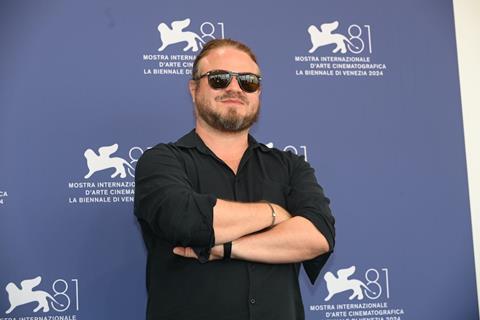
The Brutalist director Brady Corbet says it is “silly” to talk about film runtimes, at the press conference for his 215-minute Venice Competition feature.
“The film does everything we are told we are not allowed to do,” said Corbet. “It’s quite silly to have a conversation about runtime; that’s like criticising a book for being 700 pages vs 100 pages. For me, it’s about how much story there is to tell.
“Maybe the next thing I’ll make should be 45 minutes and I’ll be allowed to do that,” continued the director. “The idea we should fit inside a box is quite silly – we should be past that, it’s 2024. As Harmony Korine once said – cinema is stuck in the birth canal, and I agree with him, so we need to help it out.”
Isaach de Bankolé, one of Brady’s cast members, echoed his words. “The length of the movie has nothing to do with the story of life. Life can be short or long, depends on the way we approach it.”
The film’s two press and industry screenings last night (August 31) in Venice played with respective 15-minute intervals in addition to the runtime, each accompanied by a countdown clock on the screen. Screen understands that this afternoon’s premiere will also include the interval.
The topic of which stories can be told today and how they are told came up several times in the conference. “Yes, there are many stories that cannot be told in Hollywood,” said Corbet forcefully.
The Brutalist stars Adrien Brody and Felicity Jones as visionary architect László Toth and his wife Erzsébet, who flee post-war Europe in 1947 to rebuild their legacy and witness the birth of modern America, where their lives are changed forever by a mysterious and wealthy client.
“This was an incredibly difficult film to make,” said Corbet, who appeared close to tears behind his dark sunglasses at several stages in the conference. “I’m very emotional today because I’ve been working on it for seven and it felt urgent every day for the better part of a decade.”
He gave different outlines of what the film is about, first saying it is the “psychological manifestation of the trauma of the 20th century.” Later, when asked about its parallels to the current Israel-Hamas conflict, Brady said, “The film is about a character who flees fascism only to encounter capitalism. That’s what the movie is about.”
“This is my third film in the last decade, of course people tried to impose their ideas and opinions over the course of the project,” said the director, when asked if partners on his films try to affect what he makes. “My central team of producers were truly extraordinary. I have never felt more supported.”
Brody said his own heritage – his mother Sylvia Plachy is a Hungarian immigrant who fled the country in 1956 during the Hungarian revolution – informed his work. “It’s a beautifully written and constructed character on the page, but it is one I felt immediate kinship and understanding for, that I was adept to play,” said Brody. “I understand a great deal about the repercussions of that on [his mother’s] life and her work as an artist, which is a wonderful parallel with Lazlo’s creations and how they’ve evolved and how post-war psychology influences your work in a creative manner and all aspects of your life moving forward.”
Focus Features acquired international rights to The Brutalist in Berlin this year.















![[L-R]: Amanda Villavieja, Laia Casanovas, Yasmina Praderas](https://d1nslcd7m2225b.cloudfront.net/Pictures/274x183/6/4/1/1471641_pxl_20251224_103354743_618426_crop.jpg)









No comments yet